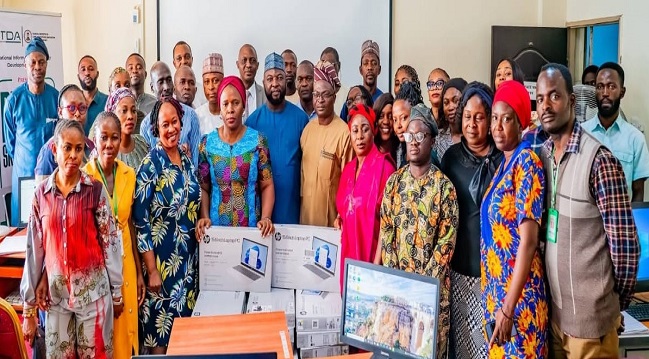News
Why We’re Attracted to Founders with Clear Direction for their Startup – Ifeoluwa Adepoju

Ifeoluwa Adepoju, a lawyer with over 6 years of legal experience. She is an LLM graduate of Business Law and currently heads the legal and compliance team at Future Africa. Ifeoluwa has worked with over 50 startups giving her current role in a VC firm and in her capacity in the tech ecosystem. In this interview with Ugo Onwuaso, she shares her experience assisting startups set up structures, scale and fund-raising processes. Excerpts:

Ifeoluwa Adepoju,
What actually led you to pick interest in startups?
I’ve always been drawn to startups because they’re like the underdogs with big dreams. Imagine this: a small group of people with a brilliant idea, working hard to turn it into something amazing. That kind of energy and determination is contagious.
Before I moved into the VC space, I have worked with many founders and their needs to get the right team, the right agreements, getting them ready to becoming investable, starts right from the formation of the company.
There’s this one startup I worked with early on. They had this revolutionary concept, and I got to be a part of their journey. We faced challenges together, including legal complexities, and celebrated victories.
Seeing them grow from a small idea to a successful venture was incredible, and it fueled my passion for helping startups thrive.
It’s like being part of a story where every small decision can make a huge impact. That’s why I love startups – they’re full of potential, surprises, and the thrill of making things happen.
A lot of startups struggle to raise funds. What do you think is responsible for this?
It is one thing to have a great idea; it is another to tell your story. The impact of storytelling is great when it comes to storytelling. One thing that makes each compelling story about how their product or service addresses a real market need is crucial in attracting investor interest.
Investors are not just looking at numbers; they want to be captivated by a story that resonates with the problem the startup aims to solve.
When startups can articulate their journey in a compelling way, it humanizes the business, making it relatable and memorable.
The power of storytelling lies in creating an emotional connection, helping investors understand not just what the startup does, but why it matters. a well-crafted narrative helps startups stand out in a crowded market. It differentiates them, making them more memorable amidst numerous pitches.
Successful fundraising often starts with a captivating story that leaves a lasting impression on potential investors, compelling them to be a part of the startup’s journey.
What are the things startup founders must bring to the table to convince VCs to make investment decisions?
Clear Vision and Mission: A well-defined vision and mission that communicates the startup’s purpose and long-term goals. VCs want to invest in founders who have a clear direction for their company.
Transparency and communication
Coachable founders and Capable Team: A skilled and dedicated team with relevant expertise. VCs invest not only in ideas but also in the people behind them and people who are teachable
Traction and Milestones: Demonstrable traction and achieved milestones, showcasing that the startup has made progress and has the potential for scalability. This could include user growth, revenue, partnerships, or product development milestones.
Market Understanding: In-depth knowledge of the target market, including a thorough understanding of competitors, potential challenges, and the overall industry. VCs want to see that founders have conducted comprehensive market research.
Effective Storytelling: The ability to tell a compelling story. Founders should be able to communicate their journey, challenges faced, and how they overcame them. Storytelling helps create an emotional connection with investors.
Scalability Plan:
There is ongoing debate as why VCs prefer to invest in a Deleware Corporation than an LLC. What is your take on that?
Registering a company in Delaware, whether as an LLC (Limited Liability Company) or a Corporation, is a popular choice for many businesses due to Delaware’s favourable business-friendly laws for startups.
LLCs are “pass-through entities,” meaning that profit (or loss) is passed through to the owners as income, and is taxable as such. VCs want no part of this as they are not investing solely to have any of the profits or losses of these businesses pass through to them.
Instead, VCs want to invest in C corporations, where the profit and loss are ascribed to the business and not the owners, allowing losses to be used to offset future revenues for tax purposes.
This does not mean that some VCs are not opened to taking on these risks and there are other options available to the VCs as well which I am writing on and should be published soon.
When is a startup due to have a board ?
It is never too early or late. What matters is having the right members who have the same goal and passion with you. You can wait till you become big and still not.
This year we have witnessed some startups shutting down business/operations. Some due to financial mismanagement, economic situations, lack of skills. But for you, do you think there are foundational challenges with startups, especially in Africa?
Beyond the personal mismanagement by founders, where fundraising is sometimes viewed as an opportunity for personal financial gain rather than contributing to the company’s overall objectives, I’ve identified additional critical factors.
One major concern is the regulatory environment, which often lacks the conducive conditions necessary for a thriving business in many African startup ecosystems.
Furthermore, the engagement of shareholders and venture capitalists (VCs) post-investment is crucial. The lack of follow-up by investors can pose a significant challenge.
This emphasizes the importance of a robust board that includes experienced mentors. With the right board members providing guidance and mentorship, startups stand a better chance of navigating challenges and achieving scalable growth.
News
NITDA Equips Federal Character Commission with Data Tools to Drive Public Sector Reform

In a strategic move to modernise Nigeria’s public service, the National Information Technology Development Agency (NITDA) has concluded a specialised digital capacity-building programme for the Federal Character Commission (FCC).

The initiative, which included the donation of 35 laptops, aims to transition the Commission from manual processes to a data-driven oversight model, ensuring more transparent and equitable representation across all government MDAs.
In alignment with President Bola Ahmed Tinubu’s key priority area of reforming the economy for sustained and inclusive growth, as well as improving governance for effective service delivery, it forms part of NITDA’s Digital Literacy for All (DL4All) programme aimed at strengthening digital capacity across public sector institutions and building a workforce equipped to drive Nigeria’s digital transformation agenda.
The training, held at the Commission’s headquarters, focused on enhancing participants’ competencies in critical areas such as data analysis and data management, skills considered essential to improving institutional performance and service delivery.
Representing the Director General of NITDA, Kashifu Inuwa CCIE, the Acting Director of Digital Literacy and Capacity Building, Dr Ahmed Yusuf Tambour, explained the purpose of the intervention.
“We are here at the Federal Character Commission to carry out a training for staff of the Commission in the area of digital literacy to enhance their proficiency,” he stated.
He noted that the training was deliberately tailored to align with the Commission’s statutory responsibilities.
“We are particularly focusing on data analysis and data management, because this really aligns with the core mandate of the Commission,” he said.
The Federal Character Commission, which is responsible for monitoring and ensuring equitable representation in public service across Ministries, Departments and Agencies (MDAs), relies heavily on accurate and well-managed data to carry out its oversight functions.
By strengthening staff capacity in data handling and digital tools, NITDA aims to enhance the Commission’s ability to manage nationwide datasets efficiently and transparently.
Describing the programme as impactful and well-received by participants, Inuwa said, “So it’s been a great journey. We’ve trained 35 participants here, and the training has been very well received.”
As part of the intervention, NITDA donated 35 laptops to the Commission to facilitate continuous learning and enable staff to seamlessly integrate digital tools into their daily operations.
The gesture is expected to reinforce the sustainability of the training outcomes and improve workflow efficiency within the Commission.
Expressing optimism about the long-term benefits of the initiative, Inuwa added, “We are hoping that this will help the Commission to manage the very, very important data that they collect across all MDAs.”
The intervention reflects NITDA’s sustained commitment to deepening digital inclusion within government institutions under the Renewed Hope Agenda. By equipping public servants with practical digital skills and the necessary tools, the Agency is advancing institutional efficiency, strengthening data-driven decision-making, and supporting the Federal Government’s vision of a modern public service capable of driving inclusive national development and economic reform.
News
Nigeria, EU Ink Research, Innovation Deal Worth €100Bn

Nigeria and the European Union have inked a scientific and technology deal that grants access to about €100 billion in research and innovation funding for scientists, start-ups, and public institutions.

The agreement is a significant boost to the country’s tech environment, providing new prospects for research, innovation, and start-up growth.
The arrangement was signed in Abuja by Gautier Mignot, head of the EU delegation to Nigeria and ECOWAS, and Kingsley Udeh, Nigeria’s minister of innovation, research, and technology.
After more than two decades without a formal framework, the agreement transfers cooperation from informal to structured, large-scale collaboration.
The European Commission’s Horizon Europe programme, the world’s largest public research budget, is at the heart of the deal, which will bring together Nigerian researchers and firms to work on cross-border projects in health, agriculture, climate, food systems, and new technologies.
Udeh stated that the relationship puts Nigeria as a continental powerhouse for science and enterprise, with an emphasis on translating research into commercially viable products and assisting startups in scaling into global players.
Gautier Mignot noted that Nigerian organisations are already active in several Horizon-backed and global health research projects, but the new pact provides a legal and political framework to significantly expand participation, funding access and visibility.
To ensure delivery, both parties created a Joint Science and Technical Cooperation Committee to drive implementation and track measurable outcomes.
Beyond academia, the agreement aims to support innovators, boost university–industry collaboration, and help more Nigerian tech firms compete globally, strengthening Nigeria’s position as a leading startup hub in Africa.
News
Microplastics Found in 90 Percent of Prostate Cancer Samples

Microplastics have now been found inside most prostate cancer tumors — and at strikingly higher levels than in healthy tissue.

A new study reports that tiny plastic particles were present in nine out of 10 men diagnosed with prostate cancer.
Researchers also found that these fragments appeared in greater amounts inside cancerous tumors than in nearby noncancerous prostate tissue.
The investigation was conducted at NYU Langone Health, including its Perlmutter Cancer Center and Center for the Investigation of Environmental Hazards.
Scientists set out to examine whether exposure to microplastics could play a role in the development of prostate cancer, which the American Cancer Society identifies as the most common cancer affecting American men.
Plastic used in food containers, packaging, cosmetics, and other everyday products can break down into microscopic pieces when heated, worn down, or chemically altered.
These particles can be swallowed, inhaled from the air, or absorbed through the skin. Previous research has detected microplastics throughout the human body, including in major organs, bodily fluids, and even the placenta.
Despite their widespread presence, scientists still do not fully understand their health effects.
For this study, researchers analyzed prostate tissue samples from 10 patients undergoing surgery to remove the prostate gland. Microplastic particles were identified in 90% of tumor samples and in 70% of noncancerous samples.
Notably, tumor tissue contained significantly more plastic.
On average, cancerous samples had about 2.5 times the concentration found in healthy prostate tissue (about 40 micrograms of plastic per gram of tissue compared with 16 micrograms per gram).
“Our pilot study provides important evidence that microplastic exposure may be a risk factor for prostate cancer,” said study lead author Stacy Loeb, MD, a professor in the NYU Grossman School of Medicine’s Departments of Urology and Population Health.
Loeb explained that while earlier studies had hinted at links between microplastics and conditions such as heart disease and dementia, there had been little direct research connecting them to prostate cancer.
The findings will be presented on February 26 at the American Society of Clinical Oncology’s Genitourinary Cancers Symposium.
According to Loeb, this is the first study conducted in the West to measure microplastic levels in prostate tumors and directly compare them with levels in noncancerous prostate tissue.
To carry out the analysis, scientists first examined the tissue visually. They then used specialized instruments to measure the quantity, chemical makeup, and structural characteristics of microplastic particles. The team focused on 12 of the most commonly produced plastic molecules.
Because plastic is widely used in medical and laboratory tools, the researchers took extra precautions to prevent contamination. They replaced plastic equipment with alternatives made from aluminum, cotton, and other nonplastic materials. All testing took place in controlled, clean rooms specifically designed for microplastic analysis.
“By uncovering yet another potential health concern posed by plastic, our findings highlight the need for stricter regulatory measures to limit the public’s exposure to these substances, which are everywhere in the environment,” said study senior author Vittorio Albergamo, PhD.
Albergamo, an assistant professor in the NYU Grossman School of Medicine’s Department of Pediatrics, said the next step is to determine how microplastics behave inside the body and whether they contribute directly to cancer development. One theory the team plans to investigate is whether these particles trigger a persistent immune response (inflammation) in prostate tissue.
Over time, chronic inflammation can damage cells and lead to genetic changes that allow cancer to form.
Albergamo emphasized that the study involved a small number of patients and that larger studies will be necessary to confirm the results.
According to the Centers for Disease Control and Prevention, about one in eight men in the U.S. will be diagnosed with prostate cancer during their lifetime.
Meeting: American Society of Clinical Oncology’s Genitourinary Cancers Symposium
The research was funded by the U.S. Department of Defense.
In addition to Loeb and Albergamo, the NYU Langone research team included Leonardo Trasande, MD, MPP; Trevor Johnson, PhD; Fang-Ming Deng, MD, PhD; Mark Strong, DO; David Wise, MD, PhD; José Alemán, MD, PhD; Zixuan Mo, BS; Mariana Rangel Camacho, BS; Nataliya Byrne, BA; Tatiana Sanchez Nolasco, MPH; Adrian Rivera, MPH; William Huang, MD; Herbert Lepor, MD; Wei Phin Tan, MD; and James Wysock, MD.
Samir Taneja, MD, of Northwell Health in New York City also contributed to the study.
Loeb has consulted for pharmaceutical company Astellas, digital health company Savor Health, and men’s health organization Movember, and has received research support from Endo USA Inc. She also participated in advisory boards for Endo USA, Blue Earth Diagnostics, Pfizer, Sumitomo Pharma, and Doceree. Wysock has consulted for medical equipment manufacturers Edap — Focal One, and URO-1 Medical. Wise is a paid consultant for Pfizer, Bayer, K36, OncoC4, AstraZeneca, and Janssen Pharmaceuticals, and is an expert witness for Exxon Mobil. None of these activities are related to the current study. NYU Langone Health is managing the terms and conditions of these relationships in accordance with its policies and procedures.
Credit…..scitechdaily.com

 E-Business3 days ago
E-Business3 days agoAfDB, UNDP Launch $10Bn AI Initiative for Africa

 Telecom3 days ago
Telecom3 days agoGrey Expands Cross-Border Banking with USD Accounts, USDC Support

 General News2 days ago
General News2 days agoKPMG Strengthens Africa Leadership to Support Long‑term Growth Across the Continent

 News3 days ago
News3 days agoLotus Bank, REA Seal N100Bn Deal to Power Rural Nigeria

 News3 days ago
News3 days agoDG NITDA Reaffirms FG Commitment to Responsible, Inclusive AI

 E-Financial3 days ago
E-Financial3 days agoCBN Cuts MPR by 50bps to 26.50% as Inflation Eases for 11th Month

 E-Business2 days ago
E-Business2 days agoesentry 2025 Report Shows Healthcare, Financial Services and Telecoms as Staging Grounds for Increased Cyberattacks in Africa

 E-Financial3 days ago
E-Financial3 days agoKuda Bank Teams Up with Lovers & Frnds for Inclusive Valentine’s R&B Bash















